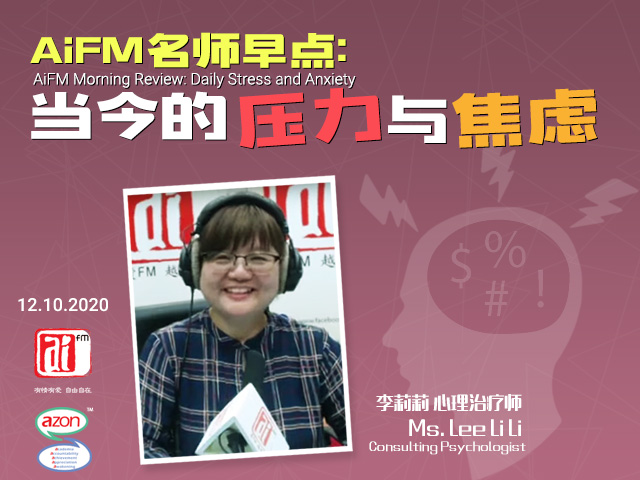 Good morning all. I am a psychologist, Lee Li Li. Today, I will be discussing mental health issues related to stress and anxiety.
Good morning all. I am a psychologist, Lee Li Li. Today, I will be discussing mental health issues related to stress and anxiety.We often hear people say: I am stressed or I am so stressed out that it almost makes me breathless! Where does this stress come from? Is it through the internal thoughts or the external environment that makes us feel stressed?
To be exact, we experience stress externally from various environment and people. The stress that we experience externally will stimulate to various degrees in both psychologically and physically. Our stress reaction psychologically and physically is called anxiety.
The symptoms of anxiety include nervousness, irritability, sweaty palms, rapid heartbeat, negative or catastrophic thoughts, avoidance/protective behaviours, etc.
Although stress is an inevitable element in life, in the face of long-term stress and anxiety that is not managed well, it will cause impairments in emotions, cognitive functions, physical health, and daily functioning.
Today, as the COVID-19 hits, the world is facing not only health and disease issues but also economic depression, rising rates of unemployment, changes in social norms, physical health, mental health and other issues that make people feel stressed out and anxious.
The flood of information makes it difficult to discern which information is reliable and useful, attention-seeking, partially false, or completely false. Without in-depth thinking and analysis, our brains can easily fall into confusion and anxious thoughts.
Also, humans are feeling stress and anxiety about the unknown. For example, in the long-term economic challenge, we would worry about losing our job or losing our business at any time. The unknown status of our health, financial and social health caused by COVID-19 can also cause stress and anxiety.
We may not be able to eliminate stress by controlling the world, but we can change the way we react to stress. Ways to respond to stress include:
First, keep yourself socially connected, share and meet with others safely. Social support such as relationships and religious beliefs is a vital part of mental health. This emotional support system accompanies and supports us through difficult times whenever we feel stressed.
Secondly, limit the time spent surfing the Internet or browsing the news. Set high-quality and reliable channels as information sources. Knowing the facts from reliable sources can help protect ourselves and our family, avoid unnecessary stress and anxiety, and help us to tide over difficult times rationally.
Third, plan to relax and practice healthy life regularly: This can be achieved by activities in nature, enjoying healthy hobbies (such as listening to relaxing music), exercising or stretching. A relaxed body and a healthy body have been proven to be more effective in reducing stress and anxiety.
Fourth, do enrich ourselves by constantly learning new knowledge and new skills and keep abreast with times. This allows us to play an important role in the quality of life, work or career competitiveness in the new norm, which not only reduces stress and anxiety but also enhances confidence and security.
Finally, if you have tried many methods and still feel that you cannot control your stress and anxiety, and these feelings affect your health and daily life, please seek the help of professional services such as psychologists, counsellors, psychiatrsts as soon as possible to avoid falling into serious mental illness.
Thank you!
Kindly click the following icon to listen the full sharing.





